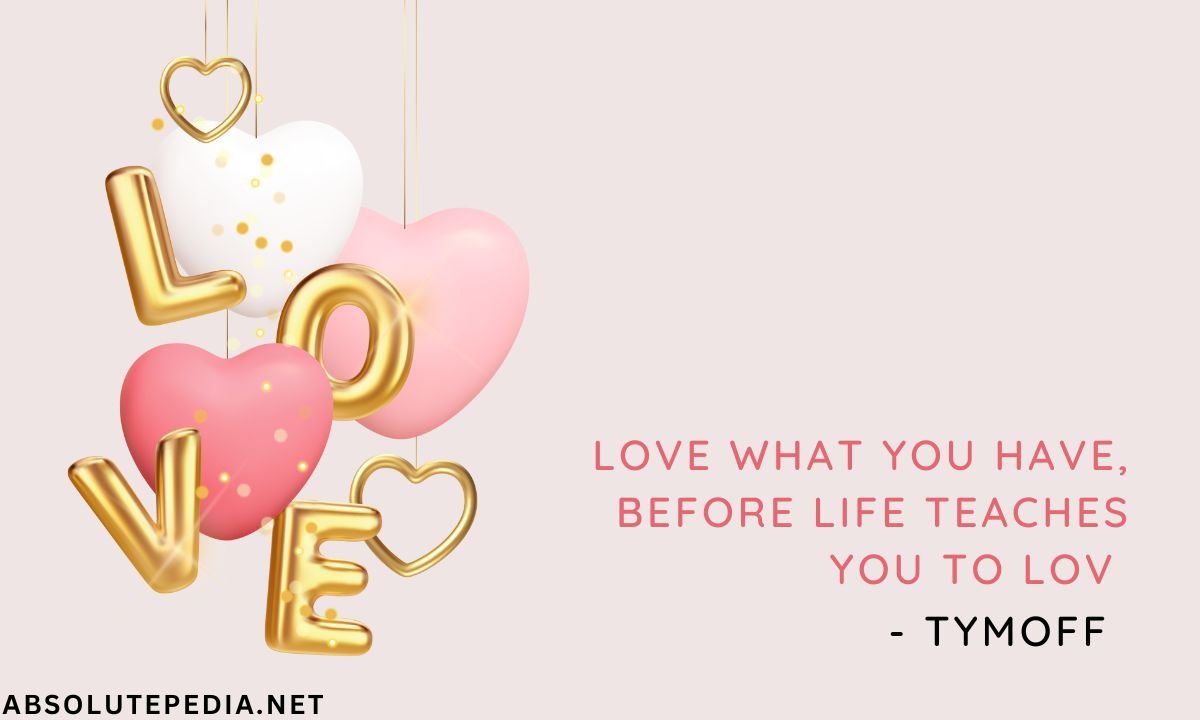
Love What You Have, Before Life Teaches You to Lov - tymoff
We frequently lose sight of the things we already have in a world where everyone is always aiming for more. We are conditioned by the present consumerist culture. To constantly want the newest and finest, which keeps us unhappy all the time. But a wise quote that Tymoff coined, “love what you have, before life teaches you to lov – tymoff,” exhorts us to change our viewpoint. This kind of thinking encourages us to enjoy the small things in life. Live in the now, and give thanks for what we already have.
Know About “love what you have, before life teaches you to lov- tymoff”
We are inundated with messages from an early age linking achievement. And, the prosperity with outward symbols of success and happiness. We’re raised to believe that achieving our goals and amassing more belongings would make us happy. But it couldn’t fulfilled all. Therefore, we’re trained to always aim higher and better.
However, as we come to understand that true happiness cannot be found in material items or outside approval, this persistent quest of more frequently leaves us feeling empty and unfulfilled.
Practicing thankfulness provides a potent remedy to the never-ending loop of wanting more. It stays in the midst of the stress of our hectic life. We can develop a sense of fulfilment and contentment that surpasses outward circumstances. It is possible by making the time to acknowledge the gifts and richness.
There is always something to be thankful for. If we take the time to search for it, we’ll get it. It may be:
- The love of friends and family
- The wonders of nature, or
- The small pleasures of daily life.
What does it teach?
The maxim “Love what you have, before life teaches you to love” was made famous by contemporary philosopher Tymoff. He places a strong emphasis on:
- Mindfulness
- Contentment, and
- Thankfulness
Though its precise beginnings are still unknown, this concept has become well-known in recent years. As of its profound simplicity and broad applicability.
According to Tymoff, struggle, loss, and difficulty have a way of teaching us to be grateful for what we have in life. He exhorts us to actively nurture appreciation and affection. To understand our existing situation rather than future difficulties.
We are constantly being told by the media that having material stuff equals happiness. We can alter it by refocusing our attention on Intangible pleasures of life, such as: Relationships, Experiences, and Personal development.
We are continually exposed to carefully chosen pictures of other people’s. Supposedly ideal lives on social media platforms. This encourages jealousy and discontent.
It is critical to accept the notion that we should be content with what we have. It’s a part of the knowledge to acknowledge the flaws in the appearance.
Learn “love what you have, before life teaches you to lov – tymoff”
Try to adapt to these tips:
- Recognise that life contains imperfections. Accept the shortcomings and difficulties that come your way. Instead than aiming for perfection since they might impart important knowledge.
- Serving others and volunteering might serve as a reminder of your life’s abundance. Kindness can also give one a feeling of purpose and fulfilment.
- If you’re upset, count your blessings. If you’re stressed, focus on presents that have a good frame of mind rather than issues.
- Honour special occasions and holidays. Give family time, charitable giving, and gift-giving priority over materialism.
- Maintain a thankfulness diary. Show the gesture of thanking other for the smallest things. Be grateful! This makes your brain more receptive to blessings.
- Say “thank you” out loud. Share your love with your loved ones. Make them feel valuable and share exactly what you value about them.
- Engage in meditations focused on thankfulness.
- Every day, set aside for five minutes. Silently praised the people, events, and blessings in your life.
Living by love what you have, before life teaches you to lov – tymoff
Practicing appreciation on a daily basis can greatly enhance one’s mental state. Someone’s mood is immediately improved. Also, their stress level is lowered when they take a few minutes to witness what they have.
And it might be as easy as taking pleasure in a hot cup of coffee or actively conversing with close friends. Developing the practice of valuing smallest things with time improves relationships.
They make a conscious effort to express to those near them. To care how much they cherish their friendships.
Conclusion
This concept is a welcome reminder to discover satisfaction and thankfulness. A door to happiness in the present moment in a world. It leads to materialism, social comparison, and the never-ending pursuit of perfection.
We may progressively incorporate this idea into our life by doing useful things. Like keeping a gratitude notebook and practicing mindfulness meditation. In the end, we can improve everything. We can build a more purposeful and entertaining life by valuing what we have.



